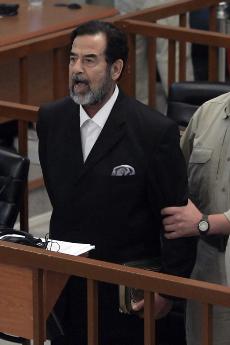Death by hanging

Former Iraqi leader Saddam Hussein yells at the court as he receives his verdict as a bailiff attempts to restrain him during his trial held under tight security in the heavily fortified Green Zone, in Baghdad, Iraq, Sunday. The Associated Press
Nov 6, 2006
Last updated on May 12, 2016 at 06:04 a.m.
BAGHDAD, Iraq – An Iraqi court on Sunday sentenced Saddam Hussein to the gallows for crimes against humanity, closing a quarter-century-old chapter of violent suppression in this land of long memories, deep grudges and sectarian slaughter.
The former Iraqi dictator and six subordinates were convicted and sentenced for the 1982 killings of 148 people in a single Shiite town after an attempt on his life there.
Shiites and Kurds, who had been tormented and killed in the tens of thousands under Saddam’s iron rule, erupted in celebration – but looked ahead fearfully for a potential backlash from the Sunni insurgency that some believe could be a final shove into all-out civil war.
Saddam trembled and shouted “God is great” when the hawk-faced chief judge, Raouf Abdul-Rahman, declared the former leader guilty and sentenced him to hang.
Get The Daily Illini in your inbox!
Televised, the trial was watched throughout Iraq and the Middle East as much for theater as for substance. Saddam was ejected from the courtroom repeatedly for his political harangues, and his half-brother and co-defendant, Barzan Ibrahim, once showed up in long underwear and sat with his back to the judges.
The nine-month trial had inflamed the nation, and three defense lawyers and a witness were murdered in the course of its 39 sessions.
“Long live the people and death to their enemies. Long live the glorious nation, and death to its enemies!” Saddam cried out after the verdict, before bailiffs took his arms and walked the once all-powerful leader from the courtroom. There was a hint of a smile on Saddam’s face.
With justice for Saddam’s crimes done, the U.S.-backed Shiite prime minister called for reconciliation and delivered the most eloquent speech of his five months in office.
“The verdict placed on the heads of the former regime does not represent a verdict for any one person. It is a verdict on a whole dark era that was unmatched in Iraq’s history,” Nouri al-Maliki said.
The White House praised the Iraqi judicial system and denied the U.S. had been “scheming” to have the historic verdict announced two days before American midterm elections, widely seen as a referendum on the Bush administration’s policy in Iraq.
President Bush called the verdict “a milestone in the Iraqi people’s efforts to replace the rule of a tyrant with the rule of law.”
“It’s a major achievement for Iraq’s young democracy and its constitutional government,” the president said.
“Today, the victims of this regime have received a measure of the justice which many thought would never come,” he added.
But symbolic of the split between the United States and many of its traditional allies over the Iraq war, many European nations voiced opposition to the death sentences in the case, including France, Italy, the Netherlands, Spain and Sweden.
A leading Italian opposition figure called on the continent to press for Saddam’s sentence to be commuted to life imprisonment.
Lost in the drama of Sunday’s death sentence was any mention of the failed search for the alleged weapons of mass destruction that Bush said led the United States to invade and occupy Iraq in March 2003.
Saddam was found hiding with an unfired pistol in a hole in the ground near his home village north of Baghdad in December 2003, eight months after he fled the capital ahead of advancing American troops.
Twenty-two months later, he went on trial for ordering the torture and murder of nearly 150 Shiites from the city of Dujail. Saddam said those who were killed had been found guilty in a legitimate Iraqi court for trying to assassinate him in 1982.
Ibrahim, Saddam’s half brother and intelligence chief during the Dujail killings, was sentenced to join the former leader on the gallows, as was Awad Hamed al-Bandar, head of Iraq’s Revolutionary Court, which issued the death sentences against the Dujail residents.





